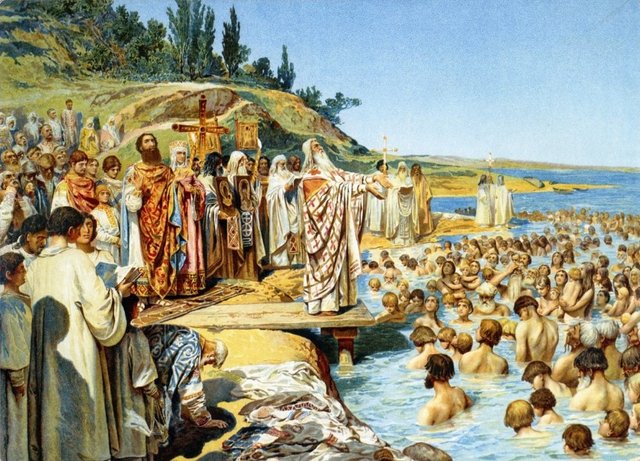When the Kharars learned of the Vikings' destruction of the land, including the burning of cities and the massacring of the people, they gathered an army and faced the Vikings when they returned. The Viking chieftain (perhaps Oleg) was killed in the subsequent combat.
Igor, Oleg's successor, was assassinated by Derevlian Slavs in 945 CE (from whom he had demanded exorbitant taxes), but his widow, Olga, proved to be a strong ruler. She mercilessly destroyed the Derevlian opposition while ruling as regent for her infant son, Svyatoslav. Olga remained the power behind the throne for the next 24 years, even after Svyatoslav took control.

image source
Olga the Vengeful Viking who became a Saintess
Svyatoslav desired to expand his empire even further. He reasoned that if he could conquer land all the way to the Volga River, he would control all trade routes between the Baltic Sea and the Caspian Sea. Svyatoslav marched his army to Itl, the Khazar capital on the banks of the Volga River, in the 960s CE. He razed the city and subsequently conquered most of the lower Danube area, effectively doubling his territory. However, the city of Kiev had been besieged by the Pechenegs, a warrior nation from Central Asia, during his lengthy absence, and he was obliged to return home to defend his mother and children.
Svyatoslav chose his three sons as regents and marched on Constantinople after forcing the Pechenegs to retreat. He was compelled to make peace with the Byzantine Empire after a defeat in 971 CE. Svyatoslav and his troops were ambushed and slaughtered by the Pechenes on their way back to Kiev in 972 CE.
Vladimir, Svyatoslav's son, was determined to keep excellent relations with Constantinople. In 788 CE, Basil II, the Byzantine emperor, gave Vladimiton his sister Anna in marriage on the condition that Vladimit convert to Christianity. Because Anna would bring territories in Crimea as a dowry and the marriage would result in a Constantinople alliance.
Vladimir said yes. His baptism was a watershed point in Russian history. Many of his subjects abandoned their old pagan gods and embraced the new faith in the years that followed. Because of the growth of Orthodox Christianity in Russia, the country has always been influenced by the eastern church.

image source
The Baptism of Rus' and the legacy to the Russian people of Holy Prince Vladmir
This is how the Viking activities in the east concluded. If you like my content leave a comment in the comment section. If you have any pointers to add, that is very welcome in the comment section.